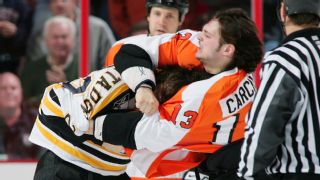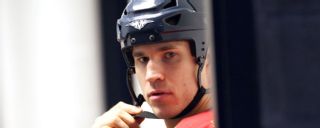|
Former NHL goaltender Ken Dryden's new book, "Game Change: The Life and Death of Steve Montador and the Future of Hockey," examines the issue of head injuries and concussions in the sport. The following excerpt from the book delves into the post-hockey struggles of Steve Montador, a defenseman who played 10 NHL seasons with six teams. Known for his rough play and his willingness to fight, Montador had a well-documented history of concussion issues and depression. After he died in 2015 at age 35, Montador was found to have widespread chronic traumatic encephalopathy, or CTE. He had been bought out by the Chicago Blackhawks, received no offers from other NHL teams, and had left the KHL behind. He had no place left to go. His phone still might ring, and he would keep on training in case it did, but this time Steve Montador knew he was done. Until this moment, everything had been about his career. Now it was about his life. He still had his place in Chicago, or he could go back to Toronto, but now without a team he had no real home. George Parros, his former Anaheim Ducks teammate, was playing in Montreal but had kept his condo in Hermosa Beach, and Steve rented it from him. One of a string of beach communities south of Santa Monica, Hermosa Beach was affluent, mostly young, with lots of cafés, bars and beach-shack restaurants. Its biggest employer was 24 Hour Fitness. It was also a place for serious surfers, paddleboarders, and beach volleyball players. It was a place for Steve to get some distance, thousands of miles away from his friends and family, from his old life, from too many people who would ask him too many questions. He had some thinking to do. He had to get himself back together and sort out what he would do next. With its sun and sea, Hermosa Beach was a place for him to get healthy. He had no practices to get up for or games to play. He didn't have teammates with needs he had to meet, or coaches he had to please. He didn't have fresh injuries to heal. He could hang out at Starbucks with his laptop and live a summer life all year round. Nobody knew him here; he had no expectations to live up to. He had never liked to tell people he met that he was a hockey player. He certainly didn't need to tell anyone now. He was single. He had money. He could put together the pieces of his life however he wanted them to fit. He could also be alone. Nobody could just drop in. He could text or call his family or friends when he wanted, whenever he had something to say and was ready to say it, and everybody would be thrilled to hear from him. He could do it on "good brain days," as Dr. Missy Holas, Steve's close friend and chiropractor, describes them, when he was sharp, and up, and able to sound just like Monty, and whoever he texted or called, he knew, would text or call others, and they all would say, "Monty sounds great. He's surfing and paddleboarding. He's in his flip-flops and doing a million things," and they would all laugh and know he was all right because this was the Monty they knew. All of which would give him even greater freedom to do what he wanted to do, and to hide. But the dark clouds wouldn't go away. Just before Christmas 2013, Nick Robinson, one of his Peterborough buddies, visited him. "Monty picked me up at the airport," Nick recalls. "He was coming from this hypnotherapist and he had lost his wallet. So we spent the next hour and a half retracing his steps, going to all the places he had been that morning and afternoon. Then he gets this call, and the wallet's at the hypnotherapist's. That was my first experience with his memory problems." Nick wasn't entirely surprised to find out that Steve had been drinking again. He hadn't heard from him much in the previous few months, which was unusual. Nick had had a problem with drinking himself when he was younger, and had used Steve as his inspiration and changed his life. Now he feared Steve was turning away from those he needed most, right at the time when he most needed them -- because he was embarrassed, because he didn't want anybody to see this Steve. But in the few days he was with him, Nick also realized Steve's problem wasn't just alcohol. "He was taking medication for depression and anxiety. He was having convulsions from all his concussions. I was also concerned about the decisions he was making, and the way he was talking and thinking. Monty was always a very deep thinker," Nick says. "He would speak logically. He would speak effectively. He would speak articulately. And he was a very good listener. That's why the dialogue between us was always so great. He would talk; I would talk; it was always fifty-fifty. Now he talked and talked and wouldn't listen." After a few days, Nick had to return to New York to go back to work. Steve had no continuity in his life. No co-workers who saw him every day. He had nobody to return home to, no wife, no partner, no roommate who might notice something. Steve was on his own, just the way he wanted it. A few weeks after his visit, Nick got a call from Steve. "I'll never forget it. Monty says, 'I'm going to follow your lead, chum. I am going back into the program.' It was a pretty fantastic moment," says Nick, "because I felt there was hope."  Steve still saw Daniel Carcillo occasionally. Carcillo had been traded to the Los Angeles Kings that summer, and the two of them spent Christmas together. "I could tell that something was up with his head," Carcillo recalls. "He was always forgetting his phone or his keys, and he didn't really look you in the eye when he was speaking to you, or hold your gaze like he used to. It just looked like he was hurting." Carcillo also knew what Steve was doing in all the hours he wasn't biking or training or dreaming of what he might do next; what he was doing at Starbucks with his laptop. "He was researching concussions," Carcillo says, "and what the f--- was going to happen to him because of them. And the more knowledge he gained, it seemed the worse he got, realizing maybe that he wasn't going to reverse the symptoms and the memory loss and the headaches." Carcillo had sustained several concussions himself. He knew that Steve was now doing a million different things because he loved to do a million different things, but also because he needed to keep his mind racing so he didn't feel his headaches or his anxiety or his depression or anything about anybody, especially himself. But a million things weren't always enough. And when they weren't enough, Steve drank; and when he drank two, he drank ten. For more than seven years he had fought those battles and won. Now he was losing. He no longer had a life-structure around him; the incentives of his career and of money were gone and not coming back, and he knew that, and he hated that. But he had so many other lives to live, and a whole big world to discover and learn about, and new people, and all the time and money he needed to do that. But what he didn't have, what was gone and not coming back -- and what he hated even more and couldn't live without -- was himself. He could still trot out the old Monty (or what he thought others thought the old Monty was, the one they loved), but not very often. And that Monty wasn't Steve now. That Monty was gone. "He knew what was going on with him," Carcillo says. "He had all those extra sets of keys made. You don't do that if you don't know something." Excerpted from Game Change: The Life and Death of Steve Montador and the Future of Hockey. Copyright © 2017 Ken Dryden. Published by Signal, an imprint of McClelland & Stewart, a division of Penguin Random House Canada Limited. Reproduced by arrangement with the Publisher. All rights reserved.
|


